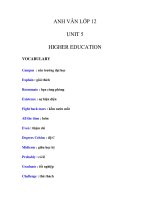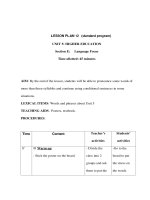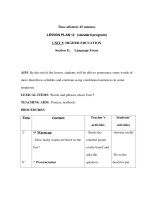unit 5 Higher Education
Bạn đang xem bản rút gọn của tài liệu. Xem và tải ngay bản đầy đủ của tài liệu tại đây (564.66 KB, 13 trang )
Saturday, October 24
th
2009
I. Pronunciation : Stress in words of more than three-
syllables
Eg: economics, philosophy, psychology
1. Trọng âm rơi vào âm tiết thứ 2 từ cuối lên:
* Với những từ có hậu tố là: - ic, -ing.
Eg: scien tific, eco nomic, engi neering
2. Trọng âm rơi vào âm tiết tr ớc các hậu tố sau:
Với những từ có hậu tố là : -ical, - logy
Eg: bi ology, eco nomical
*
* Quy tắc đặt trọng âm.
a. Listen and repeat
eco‘nomics engi‘neering geo‘graphical
psy‘chology soci‘ology ache‘ology
phi‘losophy mathe‘matics
II - Practise reading these sentences.
1. Socio – lin‘guistics is his favourite subject at the
uni‘versity.
•
English language proficiency requirements for
undergraduate courses such as engi‘neering and
mathe‘matics are considerably de‘manding.
3. Some geo‘graphical names in Australia are very difficult to
remember.
4. The entrance exami‘nation to uni‘versities in Vietnam
always takes place in July.
5. Mathematics, geo‘graphy and economics are his favourite
subjects at Ha Noi National Uni‘versity.
II. Grammar: Conditional sentences
1. Conditional sentence type 1.
a. Form:
If + S + V(s/es) + O, S + will + V(inf) + O
can
may
If clause
Main clause
b. Use:
Câu điều kiện loại 1 đ ợc dùng diễn tả điều kiện có thể
xảy ra ở hiện tại và t ơng lai t ơng lai.
Eg: If you learn hard, you will pass the exam.
2. Conditional sentence type 2.
a. Form:
If + S + V(past simple) + O, S + would + V(inf) + O
could
might
If clause
Main clause
Eg: If I knew his phone number, I would phone him.
b. Use:
Câu điều kiện loại 2 đ ợc dùng diễn tả một hành động, một
sự việc không có thực trong hiện tại mà chỉ là t ởng t ợng
hoặc mơ ớc.
3. Conditional sentence type 3.
a. Form:
If + S + had + VPII + O, S + would + have + VPII + O
If clause
Main clause
Eg: If she had stayed at home yesterday, I would
have met her.
Câu điều kiện loại 3 đ ợc dùng diễn tả điều kiện không
thật hay trái với thực tế trong quá khứ.
b. Use:
* Note: Unless = If not
Eg:These plants will die unless you water them regularly.
Exercise 1: Match each of the problems in column A with its
possible result in column B.
1. You won’t be able to get into
the examination room if
a. you won’t be able to get into
the examination room.
2. If you don’t send the
application form on time,
b. you won’t be allowed to
submit your application form.
3. If you don’t have a
reference letter,
c. you are 10 minutes late.
4. Unless you show your
identity card,
d. you won’t be able / allowed
to take the entrance exam.
A B
Exercise 2: Express these situations using conditional
sentence type 2.
E.g: She doesn’t have a car. She doesn’t go out in the evening.
If she had a car, she would go out in the evening.
1. Sarah doesn’t study hard. She hates school.
If Sarah liked school, she would study hard.
2. Peter doesn’t read a lot. He can’t find the time.
Peter would read a lot if he found the time/ had more time.
3. They don’t travel far a lot. They are afraid of flying.
If they weren’t afraid of flying, they would travel far a lot.
4. I can’t do the test. It is too difficult.
I could do the test if it was/were not too difficult.
Exercise 3: Complete the sentences with the correct form of
the verbs in brackets. ( Work in pairs)
E. g: If John had passed the GCSE exam, he would have been allowed
to take the entrance exam to the university.
1. If John ……………………( install) an alarm, the thieves wouldn’t
have broken into his house.
2. I ………………………(make) a film with him if I had been a famous
director, but I was not.
3. If you had told me earlier, I ……………………( give) it to you.
4. We would have sent you a Christmas card if we………………
( have) your address.
had installed
would have made
would have given
had had
Do languege focus exercises in
bookwork









